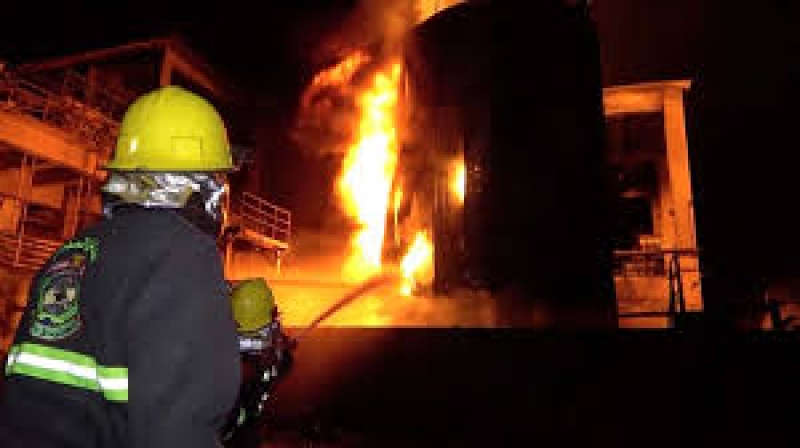- Intimidation or bloodshed cannot halt Bangladesh’s march to democracy |
- Khaleda Zia integral to an important chapter in BD history: Yunus |
- Enthusiasm marks Victory Day celebrations across Bangladesh |
- Dhaka-Delhi ties deep; to be shaped by trust, dignity, mutual respect |
- EU deploys election observation mission to Bangladesh |
Israeli airstrike on Yemen after Houthi attack on airport

On Monday, Israel’s military launched a series of intense airstrikes against Houthi rebels in Yemen’s Red Sea province of Hodeida, resulting in at least one death and 35 injuries. The attacks followed the rebels’ missile strike a day earlier that hit Israel’s main airport.
According to the Houthis’ media office, at least six airstrikes targeted the vital Hodeida port during the afternoon. Additional strikes reportedly hit a cement plant in the Bajil district, located about 55 kilometers (34 miles) northeast of Hodeida city. The full extent of the damage at both sites remains unknown.
The Israeli military confirmed that over 20 fighter jets participated in the assault, releasing more than 50 bombs on multiple targets.
Residents in Hodeida reported hearing loud explosions at the port, with smoke and flames visible in the area. They also said ambulance sirens echoed throughout the city.
“The blasts were extremely powerful,” said Ahmed Saleh, a local resident living near the port.
In Bajil, fires and thick columns of smoke were seen over the cement factory, which the Houthis said was hit by both U.S. and Israeli strikes. Ambulances also rushed to the area, said resident Khalid Seif.
The Houthi-run health ministry said at least one person was killed and 35 others were wounded in the Israeli strikes on the factory. It said rescuers were still searching for missing people.
On Sunday, the Houthis launched a missile from Yemen that struck an access road near Israel’s main airport, briefly halting flights and commuter traffic. Four people were lightly injured. It was the first time a missile struck the grounds of Israel’s airport since the start of the war.
The Houthis claimed that the strikes were a joint Israeli-American operation. However, a U.S. defense official said U.S. forces did not participate in the Israeli strikes on Yemen on Monday. The strikes were not part of Operation Rough Rider, which is the ongoing U.S. military operation against the Houthis in Yemen to prevent them from targeting ships in the Red Sea that started March 15. The official spoke on the condition of anonymity to discuss sensitive matters.
Separately, the U.S. military launched multiple strikes Monday on Sanaa, another U.S. official said. That official also spoke on condition of anonymity to discuss military operations.
Nasruddin Amer, head of the Houthi media office, said the Israeli strikes won’t deter the rebels, vowing they will respond to the attack.
“The aggressive Zionist-American raids on civilian facilities will not affect our military operations against the Zionist enemy entity,” he said on social media.
He said the Houthis will escalate their attacks and won’t stop targeting shipping routes and Israel until it stops the war in Gaza.
The Houthis have targeted Israel throughout the war in solidarity with Palestinians, raising their profile at home and internationally as the last member of Iran’s self-described “Axis of Resistance” capable of launching regular attacks on Israel. The U.S. military under President Donald Trump has launched an intensified campaign of daily airstrikes targeting the Houthis since March 15.
Houthi rebels have fired at Israel since the war with Gaza began on Oct. 7, 2023. The missiles have mostly been intercepted, although some have penetrated Israel’s missile defense systems, causing damage. Israel has struck back against the rebels in Yemen.
The Israeli military said it targeted the Hodeida port because Houthi rebels were using it to receive weapons and military equipment from Iran. Rebel-held Hodeida, about 145 kilometers (90 miles) southwest of the capital Sanaa, has been key for food shipments into Yemen as its decade-long war continues.
Israel has struck Yemen, and specifically the port city of Hodeida, multiple times. It previously struck Hodeida and its oil infrastructure in July after a Houthi drone attack killed one person and wounded 10 in Tel Aviv. In September, Israel struck Hodeida again, killing at least four people after a rebel missile targeted Israel’s Ben Gurion airport as Prime Minister Benjamin Netanyahu was arriving back to the country. In December, Israeli strikes killed at least nine people in Hodeida. The Houthis have launched multiple missiles toward Israel in the past week.
The attack on Ben-Gurion International Airport on Sunday came hours before Israeli Cabinet ministers voted to expand the war in Gaza, including to seize the Gaza Strip and to stay in the Palestinian territory for an unspecified amount of time. While air traffic resumed after an hour, the attack could lead to cancelations of many airlines, which had recently resumed flights to Israel, reports UNB.

